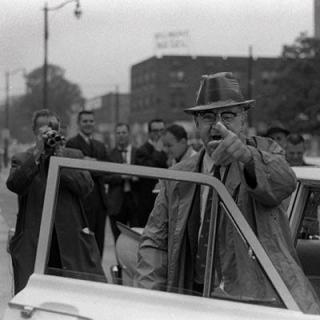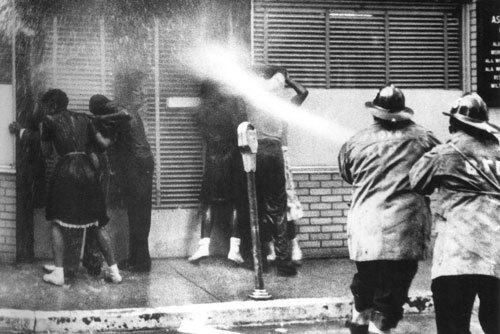
Bull Connor was Birmingham, Ala.’s notorious Commissioner of Public Safety in the 1950’s and 1960’s.
In an astonishing guest editorial published by USA TODAY, Rev. Jesse Jackson evoked imagery of the 1960s civil rights movement as a backdrop to claim the Federal Communication Commission’s plan to promote an open, competitive market for set-top boxes was racist.
“National news coverage of the snarling dogs, water hoses and church bombings in the American South were the catalysts to exposing the ugly truths of racism and bigotry in the 1960s. Local news outlets gave new meaning to what the struggle looked like for people on its front lines,” wrote Jackson. “That is why a new proposal at the Federal Communications Commission (FCC) to regulate TV ‘set top boxes’ has raised so much concern.”
That “concern” has come almost entirely from the cable and telco-TV industry and their allies, which have compared the potential breakup of a lucrative cable TV equipment monopoly to anti-Americanism, minority television genocide, an invitation to piracy and a pathway for total world domination by Google.
In April, we reported the rhetoric surrounding the proposal, which would create an open standard allowing any manufacturer to make and sell their own set-top box, had already taken Hyperbole Hill. But Rev. Jackson’s latest guest editorial rockets the ridiculousness of the cable industry’s opposition into the stratosphere.
Jackson claims (wrongly) the proposal will lead third-party manufacturers to segregate minority television content, apparently in a way that resembles life in rural Mississippi in 1962. It evokes dreams of hordes of Google vans roaming across the southern countryside looking for trouble by stripping networks like Revolt and Vme TV of their ad revenue and copyright protection. It just isn’t true. But one line in Jackson’s commentary does prove revealing — noting all these terrible events could all take place “without any compensation.”

Jackson
This is the diamond in the rough of this near-senseless editorial. Like most things in the world of Big Telecom public policy, it’s all about the money. Jackson’s Rainbow PUSH Coalition apparently isn’t what it used to be. Originally created to promote civil rights and diversity, the organization these days is just as likely to promote Big Telecom mergers and its public policy agenda, usually in exchange for contributions to Jackson’s groups, although such quid-pro-quo is always hotly denied. Therefore, we shall call them monetary “coincidences.” His coincidental association with Comcast, AT&T, Verizon and others runs back more than a decade:
- Bell Atlantic (later Verizon) coincidentally donated $1 million to Jackson and his groups. In 1999, Jackson coincidentally endorsed the merger of GTE and Bell Atlantic into a new entity known as Verizon, which coincidentally pledged $300,000 to Jackson annually through the year 2002;
- In 1998 Jackson was strongly opposed to the merger of SBC and Ameritech (which would later emerge as AT&T), suggesting it was anti-democratic. After the two companies donated $500,000 to Jackson’s Citizenship Education Fund (given a dubious rating by Charity Navigator), Jackson coincidentally did a complete 180, praising the merger. It didn’t hurt that Ameritech coincidentally sold part of its cellular business to Georgetown Partners, owned coincidentally by one of Jackson’s closest friends.
- Not to be left out, AT&T coincidentally donated $425,000 to Jackson’s Citizenship Education Fund in 1999, right after Jackson coincidentally withdrew his opposition to the merger of AT&T and TCI Cable (later sold to Comcast).
- Jackson coincidentally has maintained a regular presence in proceedings involving Comcast’s various business dealings, particularly its merger with NBCUniversal, which it coincidentally endorsed as “pro-consumer.”
 Jackson mentioned his views have the support of certain other civil rights organization including the National Urban League and the League of United Latin American Citizens (LULAC), two groups Stop the Cap! has written about extensively regarding their ongoing committed support of Big Telecom mergers, deregulation, and other public policy agendas. They don’t work for free — substantial contributions and other compensation from those same companies head into the coffers of both groups. LULAC counts AT&T, Comcast, Cox, the National Cable & Telecommunications Association, Time Warner Cable and Verizon as members of their “corporate alliance.” None of those companies support the FCC’s plan to open up the set-top box marketplace.
Jackson mentioned his views have the support of certain other civil rights organization including the National Urban League and the League of United Latin American Citizens (LULAC), two groups Stop the Cap! has written about extensively regarding their ongoing committed support of Big Telecom mergers, deregulation, and other public policy agendas. They don’t work for free — substantial contributions and other compensation from those same companies head into the coffers of both groups. LULAC counts AT&T, Comcast, Cox, the National Cable & Telecommunications Association, Time Warner Cable and Verizon as members of their “corporate alliance.” None of those companies support the FCC’s plan to open up the set-top box marketplace.
Jackson cheapens the legacy of the civil rights movement in his efforts to draw comparisons between the horrible atrocities of the past with the fat equipment profits the cable industry is counting on in the future.
His views are also simply provably wrong. Jackson’s claim that the government was somehow responsible for the destruction of local multicultural newspapers at a time when the entire newspaper industry continues to struggle against online media is ludicrous. His myopic view that the elimination of a minority tax certificate program is the reason minorities don’t own many radio and television stations today ignores the fact many former minority owners cashed out and sold those stations (at a massive profit) after the Clinton Administration deregulated the industry in the late 1990s, which lead to a massive wave of ownership consolidation. Finding individuals, minority or otherwise, that still own local radio and television stations isn’t as easy as it once was.
 Jackson and his supporters are wasting their time fighting to preserve the dying concept of the 500-channel linear TV marketplace. Consumers, minorities included, are not clamoring for more minority networks littering the cable dial that spend much of their broadcast day airing program length commercials and reruns of Good Times or The Cosby Show. Many of these networks only add to the growing cost of cable TV. Viewers want on-demand access to quality original programming they can actually find and watch.
Jackson and his supporters are wasting their time fighting to preserve the dying concept of the 500-channel linear TV marketplace. Consumers, minorities included, are not clamoring for more minority networks littering the cable dial that spend much of their broadcast day airing program length commercials and reruns of Good Times or The Cosby Show. Many of these networks only add to the growing cost of cable TV. Viewers want on-demand access to quality original programming they can actually find and watch.
We’d also remind Jackson minorities also pay the outrageous price of set-top box rentals, something Jackson and his organization should be sensitive about. Busting the set-top box monopoly means every American will pay lower rates for this equipment. We do understand it won’t help Jackson’s bank account, or those of other civil rights groups that kowtow to their corporate friends, but who exactly do they represent?
Daring to suggest that this debate has anything to do with Bull Connor’s outrageous behavior in Birmingham, Ala. in 1963, where Connor ordered the city fire department to turn fire hoses on peaceful civil rights protesters and attacked them with police dogs, tarnishes the reputation of Jackson and his group and demonstrates just how desperate the cable industry is getting trying to credibly defend a monopoly. Jackson should withdraw those remarks.


 Subscribe
Subscribe
Makes me wish MLK was still around. He used to “park” his mouth in the rear. That’s one of the main reasons MLK kept him around.. to keep him out of trouble, and embarrassing the effort. He is both idiotic AND irrelevant, and desperately trying to stay in the headlines, speaking about things he has NO understanding of. This would be the best thing to happen to TV in a long time. I already have this with a high end multimedia based computer connected to my TV and a large monitor. I even found a way around that silly HDCP… Read more »